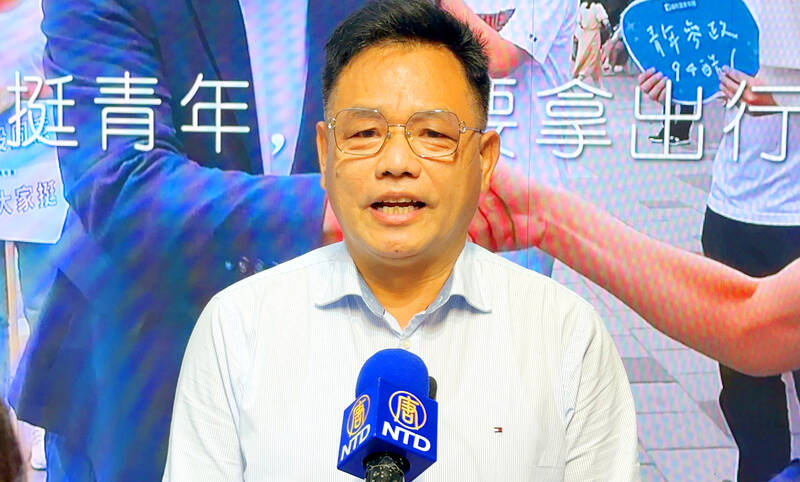Five candidates for the Hsinchu City mayoralty attended a televised forum on Wednesday to present their visions for the city, ranging from promoting city-county integration to introducing an accident insurance program to cover all residents.
Taiwan People’s Party (TPP) Legislator and Hsinchu mayoral candidate Ann Kao (高虹安) said she would push for “cooperation in the greater Hsinchu area” by establishing a communication platform between the city and county governments.
Under such an arrangement, the city mayor and county magistrate would meet twice a year to help solve common problems related to traffic, the environment, industrial development and land rights, she said.

Photo: CNA
After meeting with Hsinchu County Commissioner Yang Wen-ke (楊文科), who is running for re-election with the Kuomintang (KMT), they reached a consensus about her plan, she said.
The goal is to promote a plan to integrate the city and county before embarking on a formal merger, she said.
Kao criticized Democratic Progressive Party (DPP) lawmakers for trying to push through an amendment last year to facilitate a merger into a special municipality.
The DPP’s handling of the issue was abrupt and politically motivated, she said.
Kao, who is being investigated over allegations that she pocketed her legislative assistants’ salaries and overtime wages, expressed gratitude to her supporters for their encouragement at a time when she had become a target of what she called a “smear” campaign and “online bullying.”
Hsinchu City Councilor Lin Ken-jeng (林耕仁), who is running for mayor as a KMT candidate, pledged to introduce a free accident insurance program to the city’s 450,000 residents.
The program would cost the city government an estimated NT$55 million (US$1.77 million) per year, he said.
Lin also blamed former Hsinchu mayor Lin Chih-chien (林智堅) for the indefinite closure of the Hsinchu Baseball Stadium over the summer due to safety concerns after an extensive renovation, saying that the reopening was rushed.
The NT$1.2 billion project took three years and was closed after only two games due to multiple reports of building flaws and player injuries from a soft field.
DPP mayoral candidate Shen Hui-hung (沈慧虹), who was Hsinchu deputy mayor under Lin Chih-chien, said she would “face up to mistakes” and “commit to resolving problems.”
Shen said she would prioritize light-rail construction while building three new bridges to connect the city and county.
A plan for a four-line light-rail system in the city is being reviewed by the Ministry of Transportation and Communications.
Under the leadership of Lin Chih-chien, the Hsinchu City government had undertaken more than 1,000 infrastructure projects, including a specialized children’s hospital and a new social housing complex, Shen said.
“I believe residents in Hsinchu are aware of the changes made to the city over the past eight years,” she said.
Two independent candidates — Lee Chih-chun and Huang Yuan-fu (黃源甫) — also attended the forum.
Lee spent most of his allotted time criticizing the TPP, KMT and DPP candidates, while Huang proposed to turn Hsinchu into a travel destination for Japanese tourists.

Chinese spouse and influencer Guan Guan’s (關關) residency permit has been revoked for repeatedly posting pro-China videos that threaten national security, the National Immigration Agency confirmed today. Guan Guan has said many controversial statements in her videos posted to Douyin (抖音), including “the red flag will soon be painted all over Taiwan” and “Taiwan is an inseparable part of China,” and expressing hope for expedited reunification. The agency last year received multiple reports alleging that Guan Guan had advocated for armed reunification. After verifying the reports, the agency last month issued a notice requiring her to appear and explain her actions. Guan

GIVE AND TAKE: Blood demand continues to rise each year, while fewer young donors are available due to the nation’s falling birthrate, a doctor said Blood donors can redeem points earned from donations to obtain limited edition Formosan black bear travel mugs, the Kaohsiung Blood Center said yesterday, as it announced a goal of stocking 20,000 units of blood prior to the Lunar New Year. The last month of the lunar year is National Blood Donation Month, when local centers seek to stockpile blood for use during the Lunar New Year holiday. The blood demand in southern Taiwan — including Tainan and Kaohsiung, as well as Chiayi, Pingtung, Penghu and Taitung counties — is about 2,000 units per day, the center said. The donation campaign aims to boost

The Kaohsiung Tourism Bureau audited six hotels in an effort to prevent price gouging ahead of Korean band BTS’ concert tour in the city scheduled for Nov. 19, 21 and 22 this year. The bureau on Friday said that the audits — conducted in response to allegations of unfair pricing posted on social media — found no wrongdoing. These establishments included the local branches of Chateau de Chine, Hotel Nikko, My Humble House, and Grand Hai Lai, it said, adding that the Consumer Protection Commission would have penalized price gougers had the accusations been substantiated. The bureau said the Tourism Development Act

The military yesterday said it has located the flight data recorder, or black box, of an F-16V jet that disappeared off eastern Taiwan earlier this month, and it would soon deploy a salvage team to try to retrieve it. Air Force Command Headquarters said that while it had pinned down the location of the black box, it was still searching for the aircraft’s sole pilot, air force Captain Hsin Po-yi (辛柏毅). Without providing details, the air force said it had located the black box days after detecting some intermittent signals and would now engage a team of professionals to retrieve it. The air